Spanish Expressions Of The Day:
spanish expressions of the day:
“[name of a place] está donde Cristo perdió el mechero.” “[name of a place] está donde Cristo dio las tres voces.” “[name of a place] está donde Cristo perdió los clavos.” “[name of a place] está donde Cristo perdió las sandalias.”
Translation and examples:
El Ikea está donde Cristo perdió el mechero - The Ikea is where Christ lost his lighter.
El colegio está donde Cristo dio las tres voces - The school is where Christ screamed thrice (but + literally: where Christ gave the three voices.)
El museo está donde Cristo perdió los clavos - The museum is where Christ lost the nails.
Tu casa está donde Cristo perdió las sandalias - Your house is where Christ lost the sandals.
And all these Christ-y expressions mean ‘in a remote place.’
More Posts from Earthquakedeer and Others
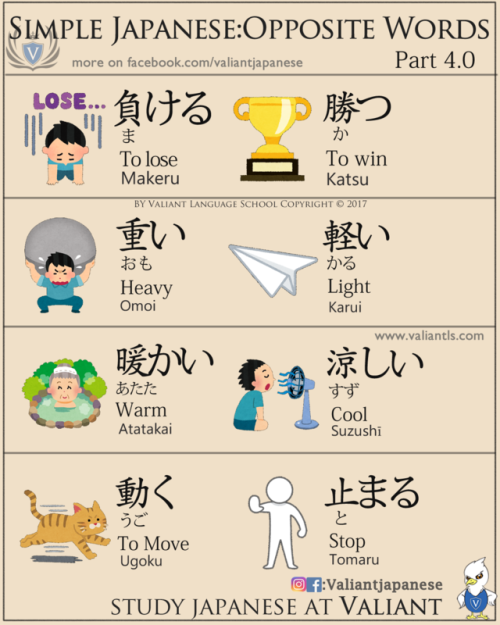
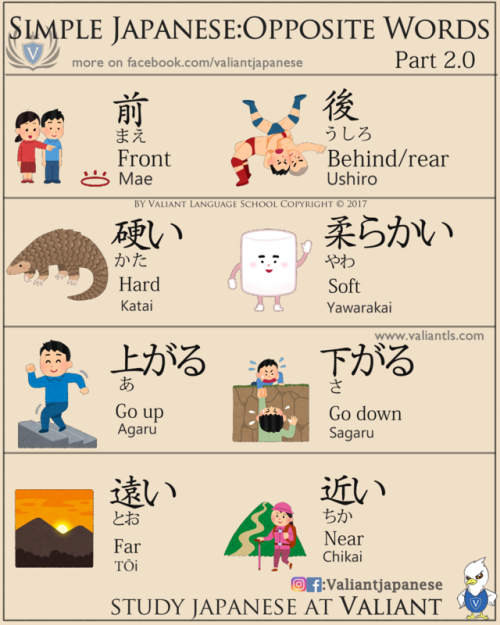
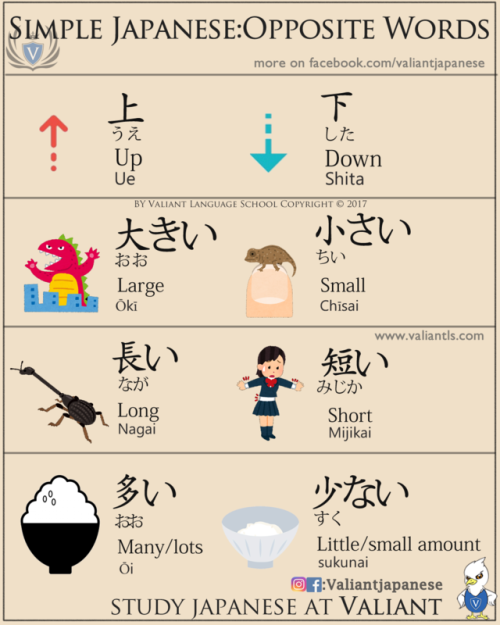
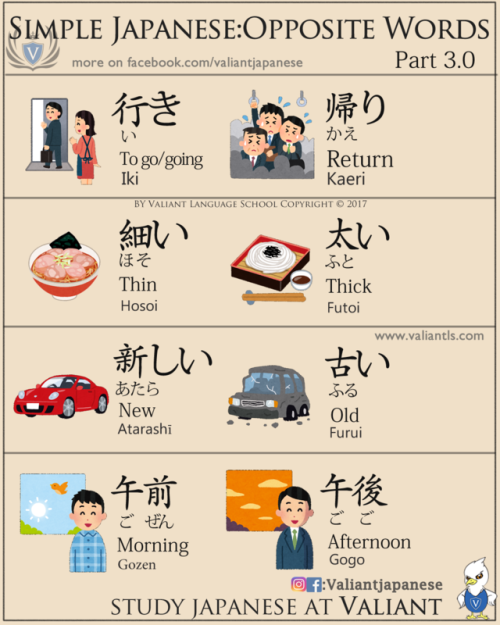
The Opposite Words in Japanese
Follow us on www.instagram.com/valiantjapanese
25 Japanese words for clothing items

1。 ベルト [beruto] ~ belt
2。母子 [bōshi] ~ cap; hat
3。ブラジャー [burajā] ~ bra
4。ブリーフ [burīfu] ~ briefs; men’s underwear
5。ドレス [doresu] ~ dress
6。ジャケット [jaketto] ~ jacket
7。ジーンズ [jīnzu] ~ jeans
8。コート [kōto] ~ coat
9。靴 [kutsu] ~ shoes
10。靴下 [kutsushita] ~ socks
11。ネクタイ [nekutai] ~ neck tie
12。サングラス [sangurasu] ~ sunglasses
13。セーター [sētā] ~ sweater
14。シャツ [shatsu] ~ shirt
15。スカート [sukāto] ~ skirt
16。スーツ [sūtsu] ~ suit
17。スニーカー [sunīkā] ~ sneakers
18。トランクス [torankusu] ~ boxers; men’s underwear
19。ズボン [zubon] ~ pants
20。手袋 [tebukuro] ~ gloves
21。スカーフ [sukāfu] ~ scarf
22。宝石 [hōseki] ~ jewelry
23。水着 [mizugi] ~ swimsuit
24。パジャマ [pajama] ~ pajamas
25。服 [fuku] ~ clothes
German Vocabulary: Die Stadt - The City

Picture: Town hall square and Alster lake, Hamburg, Germany.
Die Stadt (f) - The city
das Gebäude (n) - the building
die Straße (f) - the street
der Bürgersteig (m) / das Trottoir (n) (Switzerland & Austria) - the pavement
das Hochhaus (n) - the tower/high-rise building
der Wolkenkratzer (m) - the skyscraper
die Ampel (f) - the traffic light
das Verkehrsschild (n) - the traffic sign
das Auto (n) - the car
der Bus (m) - bus
die Bushaltestelle (f) - the bus stop
der Zug (m) - the train
die Bahn (f) - the train (less formal)
der Bahnhof (m) - the train station
der Zebrastreifen (m) / der Schutzweg (m) (Austria) / der Fussgängerstreifen (m) (Switzerland) - the crosswalk
das Taxi (n) - the taxi
das Fahrrad (n) - the bicycle
das Krankenhaus (n) / das Spital (n) (Switzerland & Austria) - the hospital
die Gasse (f) - the alleyway
die Kreuzung (f) - the crossing
die Garage (f) - the garage
der Parkplatz (m) - the parking space/parking lot
das Parkhaus (n) - the multi-story car park
das Rathaus (n) - town hall
der Verkehr (m) - the traffic
das Haus (n) - the house
der Platz (m) - the square
die Apotheke (f) - the pharmacy
das Kino (n) - the cinema
Die Post (f) / Das Postamt (n) - the post office
das Hotel (n) - the hotel
das Restaurant (n) - the restaurant
die Bank (f) - the bank
die Schule (f) - the school
die Universität (f) - the university
der Flughafen (m) - the airport
das Stadion (n) - the stadium
der Park (m) - the park
der Spielplatz (m) - the playground
der Kindergarten (m) - the kindergarten
der Fluss (m) - the river
der Hafen (m) - the harbor/port
die Philharmonie (f) - the philharmonic
die Oper (f) - the opera
das Theater (n) - the theater
die Kirche (f) - the church
die Kathedrale (f) / der Dom (m) - the cathedral
Die Moschee (f) - the Mosque
Die Synagoge (f) - the Synagogue

(after six)
always itching to look at memories, theirs and strangers’ waiting for the lights to wake before the dark curtain falls they hardly say their thanks and their sorry here never leave shapes of their absence, just their leftover warmth
_DSC0093 by Kevin Ho
Reblog if you’re a studyblr
I’m a new studyblr and I need to follow more people! Please reblog if you post at least 80% studyblr :)
German Verbs
A list of useful verbs because my knowledge of verbs in German is very limited
sein - to be haben - to have gehen - to go laufen - to walk rennen - to run fahren - to drive reisen - to travel schwimmen - to swim stehen - to stand sitzen - to sit machen - to make/do erschaffen - to create kochen - to cook essen - to eat trinken - to drink sprechen - to speak sagen - to say fragen - to ask hören - to hear zuhören - to listen mögen - to like wissen - to know (a concept) kennen - to know (a person) denken - to think glauben - to believe wollen - to want können - to be able to brauchen - to need lernen - to learn schreiben - to write lesen - to read lernen - to study verstehen - to understand vergessen - to forget erinnern - to remember üben - to practice sehen - to see beobachten - to watch tragen - to wear aufwachen - to wake up schlafen - to sleep arbeiten - to work kaufen - to buy spielen - to play benutzen - to use bringen - to bring kommen - to come zurückkommen - to return (come back) geben - to give bekommen - to receive nehmen - to take schauen - to look finden - to find treffen - to meet anfangen - to start beenden - to finish versuchen - to try entscheiden - to decide geboren werden - to be born sterben - to die leben - to live (a life) wohnen - to live (in an area) helfen - to help schicken - to send verändern - to change (alter)
[French]
If there are any mistakes or better translations please let me know!
Edit: I fixed a few mistakes
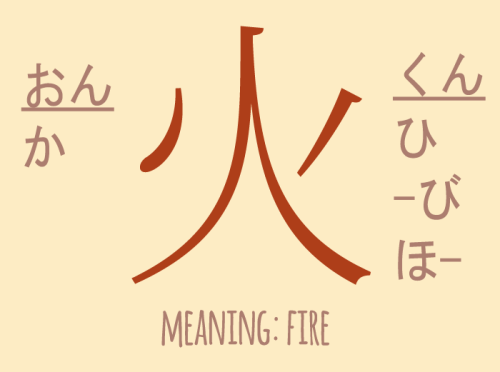
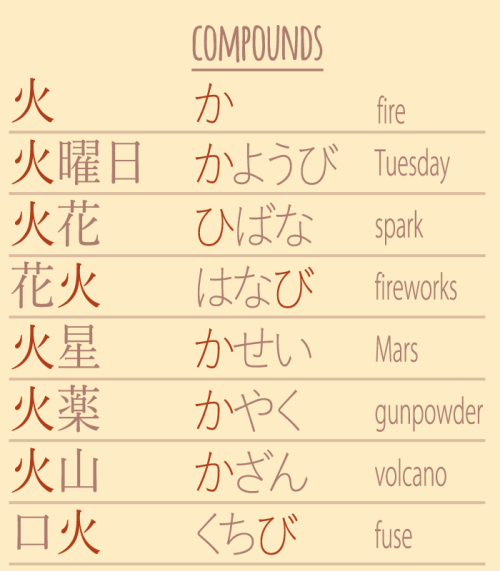
some compounds of one of my favourite kanji, 火
玉に瑕
玉に瑕 (たまにきず) - a flaw, something that spoils something otherwise pleasant. Literally “a scratch on a jewel”.




Japanese Vocabulary Diagram: 1-4
Follow us on www.instagram.com/valiantjapanese
-
 cosmic-magic-knight liked this · 4 years ago
cosmic-magic-knight liked this · 4 years ago -
 nemusoku reblogged this · 6 years ago
nemusoku reblogged this · 6 years ago -
 dracolikescupcakes liked this · 7 years ago
dracolikescupcakes liked this · 7 years ago -
 im-still-learning-languages reblogged this · 7 years ago
im-still-learning-languages reblogged this · 7 years ago -
 hiiproducesins liked this · 7 years ago
hiiproducesins liked this · 7 years ago -
 lavenderluca reblogged this · 7 years ago
lavenderluca reblogged this · 7 years ago -
 academicaimee reblogged this · 7 years ago
academicaimee reblogged this · 7 years ago -
 slurpingectoplasma reblogged this · 7 years ago
slurpingectoplasma reblogged this · 7 years ago -
 kushina liked this · 7 years ago
kushina liked this · 7 years ago -
 earthquakedeer reblogged this · 7 years ago
earthquakedeer reblogged this · 7 years ago -
 estudiamosjuntos reblogged this · 7 years ago
estudiamosjuntos reblogged this · 7 years ago -
 iulia-caesaris reblogged this · 7 years ago
iulia-caesaris reblogged this · 7 years ago -
 astrophxsics liked this · 7 years ago
astrophxsics liked this · 7 years ago -
 dusktarot liked this · 7 years ago
dusktarot liked this · 7 years ago -
 kiaababi liked this · 7 years ago
kiaababi liked this · 7 years ago -
 lenguasyarte reblogged this · 7 years ago
lenguasyarte reblogged this · 7 years ago -
 giuggiulu liked this · 7 years ago
giuggiulu liked this · 7 years ago -
 mrbotanyb liked this · 7 years ago
mrbotanyb liked this · 7 years ago -
 garland-on-thy-brow liked this · 7 years ago
garland-on-thy-brow liked this · 7 years ago
Just a person learning Japanese. Self-learner. If you're also studying Japanese and want to practice with someone (and you're also very much a beginner) then message me! はじめまして! さびーなです。よとしく!
196 posts